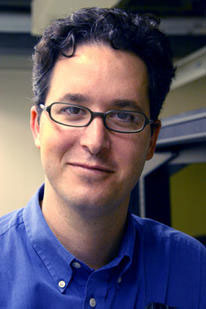| Posted: February 27, 2010 |
Exploring the implications of nanotechnology |
|
(Nanowerk News) When Arizona State University researchers talk about the nanorevolution, they mean more than something limited to the technological realm.
|
|
The manufacture, manipulation and use of materials at the nanoscale – at atomic or molecular levels – have implications far beyond science and engineering labs.
|
|
Nanomaterials are already in hundreds of commercial products, in our environment and possibly in our bodies. Researchers are studying whether nanoparticles might be making their way into our kidneys, livers and brains.
|
|
The emerging pervasiveness of nanotechnology means “it will increasingly have health, environmental, social, political and economic implications, and raise ethical issues,” says Jonathan Posner, an assistant professor of mechanical and chemical engineering in ASU’s Ira A. Fulton Schools of Engineering.
|
 |
| Jonathan Posner
|
|
Nanotechnology is at the leading edge of science and engineering today, and its development – predominantly in engineering and physical science labs – is being largely funded by federal agencies, such as the National Science Foundation (NSF).
|
|
Posner says the rapid pace of nanotechnology advances makes it all the more urgent to consider the possible widespread societal and environmental impacts.
|
|
Far-reaching impacts
|
|
The Center for Nanotechnology in Society at Arizona State University (CNS-ASU) and ASU’s Consortium for Science, Policy and Outcomes (CSPO) are among national leaders in exploring the potential ramifications of nanotechnology’s emergence. They are working with scientists and engineers such as Posner to encourage researchers to consider the big-picture perspective.
|
|
“There is a pressing need to understand the impact of nanotechnology on human health, the environment and society, to give us an informed background from which we can craft government policy and regulation, as well as legal and ethical guidelines,” Posner says.
|
|
One of Posner’s NSF-funded projects is examining health-related questions about the toxicity of engineered nanomaterials. Such nanoparticles remain largely unregulated because of a lack of data about toxicity risks.
|
|
Another project focuses on synthetic nanoscale motors and their potential for improving development of nanomachines. Researchers are seeking to understand the physical mechanisms that govern the motion of nanomachines.
|
|
They want to devise methods of producing faster and more powerful nanomotors, and to fabricate nanomotors that can serve a broad range of needs, from more effective application of medicinal drugs and environmental remediation to more accurate chemical and biological analyses.
|
|
Both projects involve efforts to encourage students to consider the broader implications of their research by examining the potential societal impacts of nanotechnology advances.
|
|
“This is about going beyond the merely technological challenges and getting students to think about what difference – good, bad or neutral – that they’ll make in the world by pursuing this work in their careers,” Posner says.
|
|
Exploring societal dimensions
|
|
Under the umbrella of CNS and CSPO, Posner is working with ASU colleagues to develop a course entitled Societal and Ethical Implications of Scientific Research, which examines nanotechnology issues. His collaborators, Jameson Wetmore, an assistant professor in the School of Human Evolution and Social Change, and Ira Bennett, an associate research professor with CSPO, have also developed Science Outside the Lab, a workshop on science policy and culture to be held in the nation’s capitol. Posner is encouraging his students to participate in the workshop.
|
|
David Guston, CNS-ASU director and CSPO co-director, says Posner’s “openness to collaborations that explore the societal dimensions of his own research in nanotechnology is characteristic of the intellectual fusion that ASU hopes to foster through its concept of the New American University.”
|
|
That fusion “is emblematic of a new generation of thinking among scientists and engineers that embraces approaches from the social sciences and humanities,” says Guston, who also is a professor of political science in ASU’s School of Government, Politics and Global Studies.
|
|
A nanotechnology future
|
|
Scientists and engineers are experimenting with nanomaterials that can propel themselves, harvest energy from their immediate environments, and transport materials 30 times their size.
|
|
Such capabilities could be put to use cleaning up pollution in the oceans, transporting medicine in the body to help fight cancer, vastly increasing the power and performance of electronic devices, or better harnessing solar power.
|
|
“There are some ‘Star Trek’ concepts that are quickly becoming reality through the use of nanotechnology,” Posner says, but there are also “potential negative implications of the nanotechnology future” that now confront us in the form of unanswered questions about the impacts of introducing more engineered nanomaterials into the ecosystems that sustain us.
|
|
“Our goal is to ensure our faculty and students integrate an examination of these questions and potential impacts into their studies and research,” Posner says.
|

